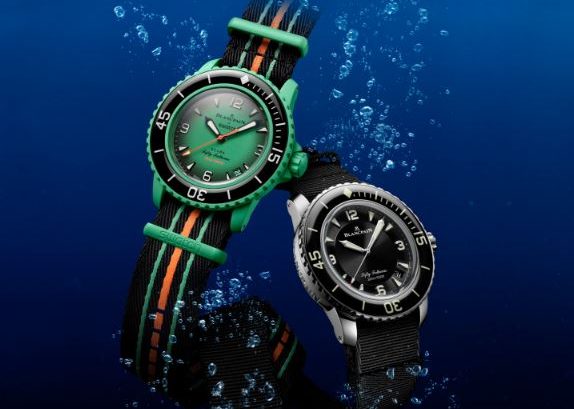Swatch is celebrating another Swiss watchmaking icon, Blancpain’s Fifty Fathoms. This watch was born exactly seventy years ago and revolutionized watchmaking by becoming the first true diver’s watch. Launched in 1953, the Fifty Fathoms was created by a diver to meet the needs of underwater exploration. It immediately became the professional timekeeping tool of choice for diving pioneers and elite marine corps around the world.
Blancpain X Swatch
In its new collaboration, Swatch honors this icon with five new models, all while staying true to itself in a fun, playful way. Named Bioceramic Scuba Fifty Fathoms, the collection references the brand’s own diver’s watches, the SCUBA line. The watches in this non-limited collection faithfully reproduce all the Fifty Fathoms hallmarks: superior water resistance, outstanding legibility, mechanical movement, secured rotating bezel and anti-magnetic protection. Blancpain and Swatch drew their inspiration from the deep seas to create a collection of five Swatch models. Each one is named after one of the blue planet’s five oceans: ARCTIC OCEAN, PACIFIC OCEAN, ATLANTIC OCEAN, INDIAN OCEAN and ANTARCTIC OCEAN.
Blancpain X Swatch
True to form for a diver’s watch, the Bioceramic Scuba Fifty Fathoms is water resistant in deep water, down to 91 meters. It’s another nod to Blancpain: the name Fifty Fathoms refers to the fathom – Historically the maritime measure of depth in the English-speaking world – fifty fathoms equals 91 meters (or 300 feet).
The Bioceramic Scuba Fifty Fathoms is equipped with a Swatch mechanical movement, the SISTEM51, the first and only mechanical movement whose production is entirely automated. The mechanism is anti-magnetic, thanks to its Nivachron™ hairspring, and has just 51 parts including one central screw as well as a 90-hour power reserve. In 2013, SISTEM51 revolutionized the world of automatic watches with its visible movement: the front tells the time, the back tells the story.
In keeping with this idea, the back of all five watches features an illustration of a magnificent, colorful animal found in all five oceans: the nudibranchs (scientific name: Nudibranchia). They are featured in a digital print on the movement’s rotor. This rotor allows the watch to recharge automatically with a simple movement of the wrist. On the ARCTIC OCEAN watch is the nudibranch Dendronotus Frondosus, characterized by its soft, subtle shapes. The PACIFIC OCEAN features Chromodoris Kuiteri. Bright as the sun, it recalls these warm, clear blue waters. The ATLANTIC OCEAN has Glaucus Atlanticus. Its deep blue colors pay tribute to wild seas. But don’t be fooled: even though this species highlights the fragility of marine life, it’s still poisonous – nicknamed the blue dragon. The INDIAN OCEAN, with its Nembrotha Kubaryana, evokes the mesmerizing colors of corals and the lush, dazzling waters. Finally, the ANTARCTIC OCEAN features Tritoniella Belli, recalling the mystery and allure of icy polar waters. It resembles an iceberg battered by storm waves. All these nudibranchs actually live in the oceans their watches are inspired by. Each watch also has a depiction of the ocean it represents on the back.
All the models in this collaboration between the two Swatch Group brands are made of Bioceramic. This unique material is patented by the brand and made of two-thirds ceramic and one-third biosourced material derived from castor oil. As an expression of commitment to ocean preservation, the NATO straps are made from recycled fishing nets that have been removed from the sea.
The shared Blancpain X Swatch logos can be found on the dial and crown. The word “Swatch” is also inscribed on the case, just as “Blancpain” is inscribed on the original Fifty Fathoms watches. The back of the watch features inspirational inscriptions like PASSION FOR DIVING – LICENCE TO EXPLORE – OCEAN BREATH – PROTECT WHAT YOU LOVE and IMMERSE YOURSELF.
For absolute Fifty Fathoms devotees, the ARCTIC OCEAN model features a special symbol on the dial: a red trefoil on a yellow background with a white cross cutting through it. The words “NO RADIATIONS” are placed below the logo to drive the message home. In the sixties, the dials on these diver’s watches used the “NO RADIATIONS” logo to show that they did not contain radium. Since then, they have become highly sought-after collectors’ items. Today, they are part of the legendary Fifty Fathoms heritage.
Another noteworthy reference can be found on the ANTARCTIC OCEAN model: a genuine water contact indicator that detects the presence of water. Since 1954, Blancpain has added this feature to some of its models intended for use by diving clubs and military units. Placed at 6 o’clock on the dial, the sensor ensures that the watch’s water resistance has not been affected by the previous diver’s use. A change in sensor color would indicate a trace of moisture. A number of Fifty Fathoms models equipped with the two-color sensor bear the name “MIL-SPEC“, in accordance with US Navy specifications.
The new Blancpain X Swatch Collection comes in exclusive colors that were specifically developed for this collaboration. They add a strong, playful and original touch to Blancpain’s professional diver’s watches. Every Bioceramic Scuba Fifty Fathoms has its own identity and makes its own allusions to the Blancpain collection.
The watches in this new Swatch collaboration are available from September 9 and only at selected Swatch stores worldwide. As with the Bioceramic MoonSwatch, purchases are limited to one watch per person per day. The watches will be presented in a special diving case. They will also be on display in selected Blancpain boutiques for several weeks.
SISTEM51 by Swatch
SISTEM51 is an automatic mechanical movement (self-winding) made up of 51 parts in total. Each of these parts forms five distinct pre-assembled, pre-welded modules. The transparent oscillating weight that controls the automatic winding is fixed by the movement’s one and only screw. Conventional automatic watches have twice as many parts if not more. Some of the more complicated high-end models have more than 600. These are assembled by hand over a number of weeks, sometimes months, by master watchmakers in their workshops.
SISTEM51 is the first and only mechanical movement with fully automated assembly. The high-tech escapement does not have a regulator (no-index assembly). The rate, or precision, is factory-set using laser technology. This avoids the manual adjustments usually required with mechanical watches. The movement, with its 90-hour power reserve, is made of German Silver and anti-rust by design. All parts are housed in a hermetically sealed case. That means no moisture, no dust and no impurities that could impair performance, guaranteeing longevity and lasting precision over time (-5/+15 seconds per day).
Each Swatch featuring a SISTEM51 movement is made visible thanks to a display back. This feature has enabled Swatch to stand out from the crowd from the very beginning since this transparency is a key part of SISTEM51. Automatic movements are driven by an oscillating weight. In SISTEM51, this weight is shaped like a transparent disk that rotates freely on the single central screw, providing a captivating view of the mechanism. The oscillating weight and the visible surfaces of all five modules of the movement are all imprinted, which ramps up the potential to add a creative touch to the back of this watch and, of course, set up new collaborations, something the brand has been doing for forty years now.
SISTEM51 is the ultimate embodiment and celebration of Swiss manufacturing as a state of mind, one based on absolute quality of innovation, provocation, maintaining traditions and research.
Blancpain Fifty Fathoms
Seventy years ago, an icon was born: the Fifty Fathoms. The watch that would go on to revolutionize watchmaking by becoming the first modern diver’s watch was designed by a passionate scuba diver, Jean-Jacques Fiechter. At the time he was CEO of Blancpain. He was a pioneer in a discipline that was still in its infancy and he grasped how vitally important it was to be able to track time underwater.
The tool he designed to meet his own needs instantly found unanimous favor with the ocean community, so much so that it became an unwavering ally of elite divers and underwater explorers. Over time, it became a highly valued diver’s watch and was worn by Jacques-Yves Cousteau and his team of divers in his film The Silent World, among others. It was also used by the Navy Seals elite diving unit, as well as German and French marines, to name a few. By making diving safer, Fifty Fathoms has played a part in the development of this sport and encouraged people to discover the world of the oceans. The year 2023 marks 70 years of Fifty Fathoms as well as a re-birth with the arrival of an innovative anniversary diver’s watch: the Fifty Fathoms Tech Gombessa. Since the fifties, diving has experienced immense changes, the biggest being a major increase in the amount of time a diver can spend underwater. Although the 1953 Fifty Fathoms met the needs of Jean-Jacques Fiechter and the veteran divers of the time, today’s technical divers, who are able to spend several hours underwater, have new needs when it comes to timekeeping. And the Fifty Fathoms meets these perfectly.
The Fifty Fathoms has played a key role in the development of underwater diving and discovering the ocean world. It has enabled Blancpain to forge strong ties with the ocean community and these ties have only grown stronger over the last 70 years. Exploring and preserving the oceans have always been key concerns for Blancpain. Throughout the history of its Fifty Fathoms diving watch, the brand has forged strong ties with explorers, photographers, scientists and environmental specialists who know how invaluable these precious resources are. These ties have led Blancpain to provide substantial support to important activities and initiatives dedicated to the oceans. Thus was born the Blancpain Ocean Commitment (BOC) program. The Fifty Fathoms is the catalyst for this commitment.

